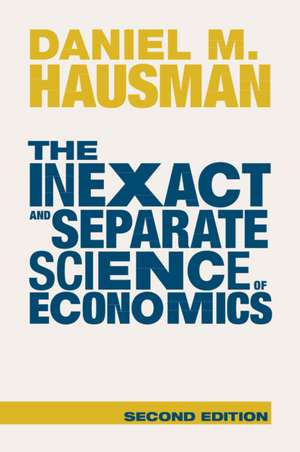The Inexact and Separate Science of Economics
Autor Daniel M. Hausmanen Limba Engleză Paperback – 7 iun 2023
| Toate formatele și edițiile | Preț | Express |
|---|---|---|
| Paperback (1) | 276.65 lei 3-5 săpt. | +33.32 lei 7-13 zile |
| Cambridge University Press – 7 iun 2023 | 276.65 lei 3-5 săpt. | +33.32 lei 7-13 zile |
| Hardback (2) | 733.54 lei 6-8 săpt. | |
| Cambridge University Press – 7 iun 2023 | 733.54 lei 6-8 săpt. | |
| Cambridge University Press – 30 ian 1992 | 759.59 lei 39-44 zile |
Preț: 276.65 lei
Nou
Puncte Express: 415
Preț estimativ în valută:
52.94€ • 56.61$ • 44.14£
52.94€ • 56.61$ • 44.14£
Carte disponibilă
Livrare economică 27 martie-10 aprilie
Livrare express 13-19 martie pentru 43.31 lei
Preluare comenzi: 021 569.72.76
Specificații
ISBN-13: 9781009320276
ISBN-10: 1009320270
Pagini: 450
Dimensiuni: 230 x 153 x 31 mm
Greutate: 0.73 kg
Ediția:2
Editura: Cambridge University Press
Colecția Cambridge University Press
Locul publicării:Cambridge, United Kingdom
ISBN-10: 1009320270
Pagini: 450
Dimensiuni: 230 x 153 x 31 mm
Greutate: 0.73 kg
Ediția:2
Editura: Cambridge University Press
Colecția Cambridge University Press
Locul publicării:Cambridge, United Kingdom
Cuprins
Part I. Introduction: Content, Structure and Strategy of Mainstream Economics: 1. Rationality, preferences and utility theory; 2. Demand and consumer choice; 3. Theory of the firm and general equilibrium; 4. Equilibrium theory and normative economics; 5. Equilibrium theory and macroeconomic models; 6. Models and theories in economics; 7. The structure and strategy of economics; 8. Overlapping generations: a case study; Part II. Theory Assessment: 9. Inexactness in economic theory; 10. Mill's deductive method and the assessment of economic hypotheses; 11. Methodological revolution; 12. Karl Popper, Imre Lakatos: Falsificationism and research programs; 13. The inexact deductive method; 14. Casting off dogmatism: the case of preference reversals; Part III. Conclusion: 15. Economic methodology; 16. Conclusions.
Notă biografică
Descriere
A comprehensive overview of theoretical economics, its distinctive modeling strategy, applicability, and empirical support.
Recenzii
"Overall, this book is well written, cogently argued, and extremely thought provoking. Hausman has a thorough grasp of both the important philosophical literature and the important economic literature. And the book contains an excellent short appendix discussing the major issues in the philosophy of science." Choice
"This is a fine book on the methodology of economics....This book offers a clear and perceptive discussion of the methodology of economics which maintains a delicate balance between the detailed discussion of the practice of economic analysis, the general debates within the philosophy of science, the history of economic method, the debate between allternative methodological schools, and the proposal of methodological reform. Indeed, the skill with which these various themes are handled and integrated, and the many detailed arguments deployed, makes this book extremely valuable as a self-contained text for an advanced undergraduate course in economic methodology, but no less interesting for the more experienced student of methodology, or the practising economist." Alan Hamlin, Times Higher Education Supplement
"Th[is] book is well worth reading and mulling over; much of what it has to say needs to be considered by institutionalists as well as by neoclassicists." Journal of Economic Issues
"...challenging and stimulating...[this book] does reflect an insightful familiarity with the nature and uses of economics. Its criticisms of the discipline are not to be lightly dismissed. It is definitely recommended reading for academic economists and advanced graduate students." Social Science Quarterly
"...presents a major intellectual challenge to economic methodology and economic science. He would have us embrace Mill's conception of economics as an inexact and separate science. His proposed reconstruction of economic science deserves both our attention and our considered scrutiny." James R. Wible, Southern Economic Journal
"...a timely and persuasive reformulation and defense of the traditional view of economic methodology. In my judgment, this is the best book on the methodology of economics in many years." David Phillips, Philosophical Review
"This is a fine book on the methodology of economics....This book offers a clear and perceptive discussion of the methodology of economics which maintains a delicate balance between the detailed discussion of the practice of economic analysis, the general debates within the philosophy of science, the history of economic method, the debate between allternative methodological schools, and the proposal of methodological reform. Indeed, the skill with which these various themes are handled and integrated, and the many detailed arguments deployed, makes this book extremely valuable as a self-contained text for an advanced undergraduate course in economic methodology, but no less interesting for the more experienced student of methodology, or the practising economist." Alan Hamlin, Times Higher Education Supplement
"Th[is] book is well worth reading and mulling over; much of what it has to say needs to be considered by institutionalists as well as by neoclassicists." Journal of Economic Issues
"...challenging and stimulating...[this book] does reflect an insightful familiarity with the nature and uses of economics. Its criticisms of the discipline are not to be lightly dismissed. It is definitely recommended reading for academic economists and advanced graduate students." Social Science Quarterly
"...presents a major intellectual challenge to economic methodology and economic science. He would have us embrace Mill's conception of economics as an inexact and separate science. His proposed reconstruction of economic science deserves both our attention and our considered scrutiny." James R. Wible, Southern Economic Journal
"...a timely and persuasive reformulation and defense of the traditional view of economic methodology. In my judgment, this is the best book on the methodology of economics in many years." David Phillips, Philosophical Review
